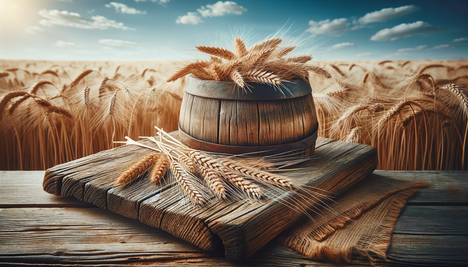Rye husks

In the constant search for healthy food for our dogs, we often come across unexpected ingredients that can be both nutritious and potentially problematic. Rye hulls, a by-product of rye flour production, are an interesting topic in this context. This article delves into the world of rye hulls to shed light on their benefits and potential drawbacks for our dogs' diets.
What are rye hulls?
Rye hulls are the outer layers of the rye grain that are removed during flour production. Rich in fiber, minerals and antioxidants, they are considered a valuable by-product in the human diet. But what about their use in dogs?
Benefits of rye hulls for dogs
Increased fiber content
Rye hulls are an excellent source of fiber that can promote intestinal health. They can help keep the digestive system going by regulating bowel movements, helping to prevent constipation.
Support with weight control
The high fiber content of rye hulls can promote a feeling of satiety and thus regulate food intake. This can be particularly beneficial for dogs that tend to be overweight.
Source of antioxidants
Rye hulls contain antioxidants that can help reduce oxidative stress and strengthen the immune system. They therefore contribute to the dog's general health and well-being.
Disadvantages and risks of rye hulls for dogs
Potential digestive problems
Although fiber is important for intestinal health, excessive intake can lead to digestive problems, including bloating, abdominal pain and diarrhea. A balanced diet is therefore crucial.
Contains gluten
Rye hulls, like rye flour, contain gluten. This can lead to health problems in dogs with gluten intolerance or coeliac disease.
Risk of harmful substances
As with all cereal products, rye hulls carry the risk of contamination with harmful substances, including mycotoxins, which are produced by molds. Careful selection and processing are therefore important.
Should you feed your dog rye hulls?
The decision to include rye hulls in your dog's diet should be carefully considered. In small amounts and as part of a balanced diet, rye hulls can provide health benefits, particularly in relation to gut health and weight control. However, it is important to watch for signs of intolerance or allergic reaction and exercise caution in dogs with known gluten intolerance.
Recommendations for feeding
- Start with small amounts to test tolerance.
- Monitor your dog for possible side effects or intolerances.
Rye hulls can be a useful addition to your dog's diet, provided they are used in moderation and the dog is not intolerant to gluten. As with any new food ingredient, it is important to consider your dog's individual needs and health. A balanced diet that provides all the necessary nutrients remains the key to a healthy and happy dog's life.
If you notice any signs of hypersensitivity or poisoning in your dog, you should see your vet immediately. We are not a substitute for a vet, but we try to be as accurate as possible. Every dog reacts differently and we recommend you get a second opinion or consult your vet if in doubt.
Stay healthy and take good care of your four-legged friend!😊